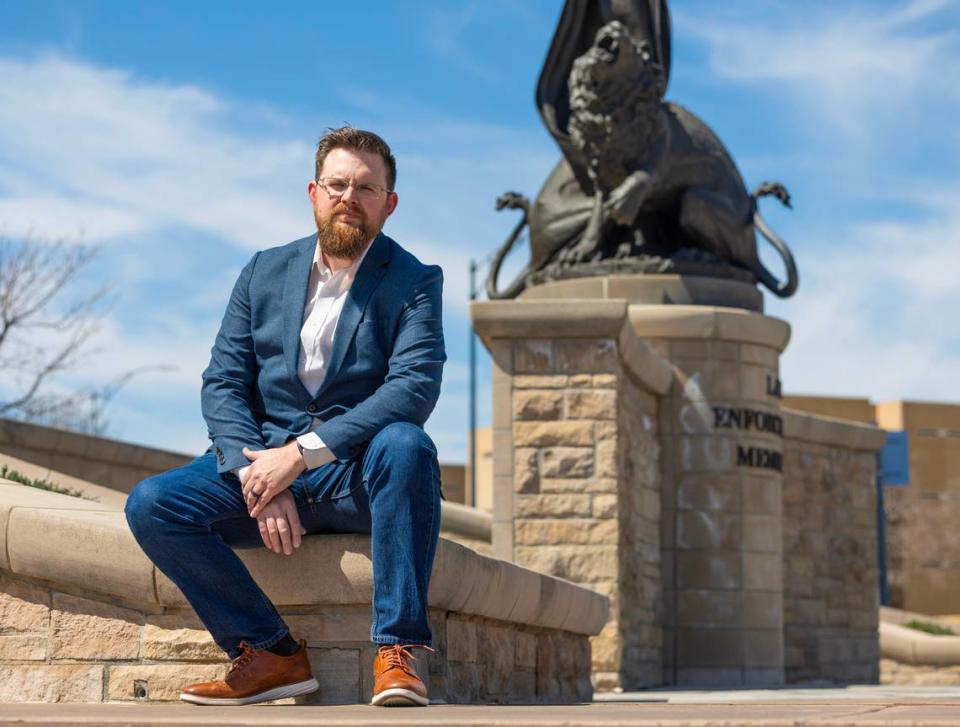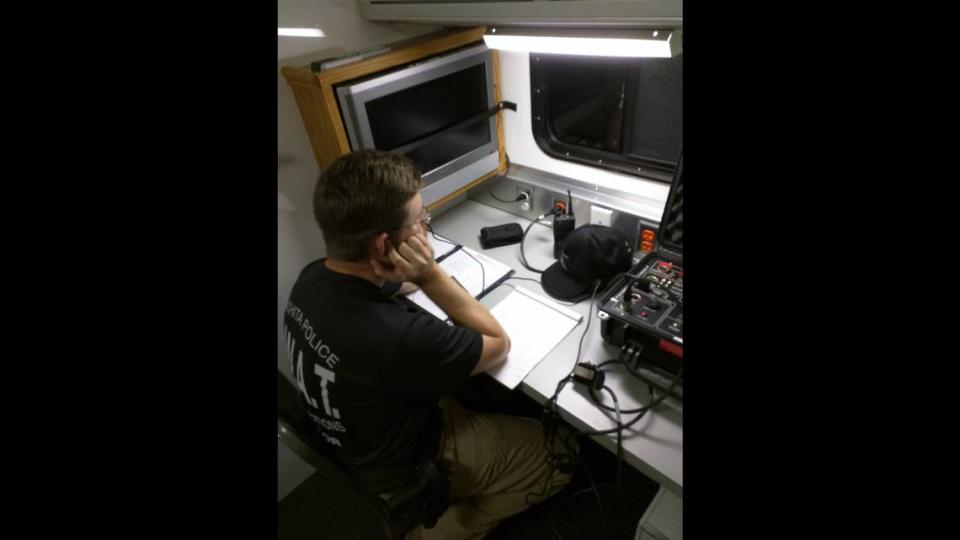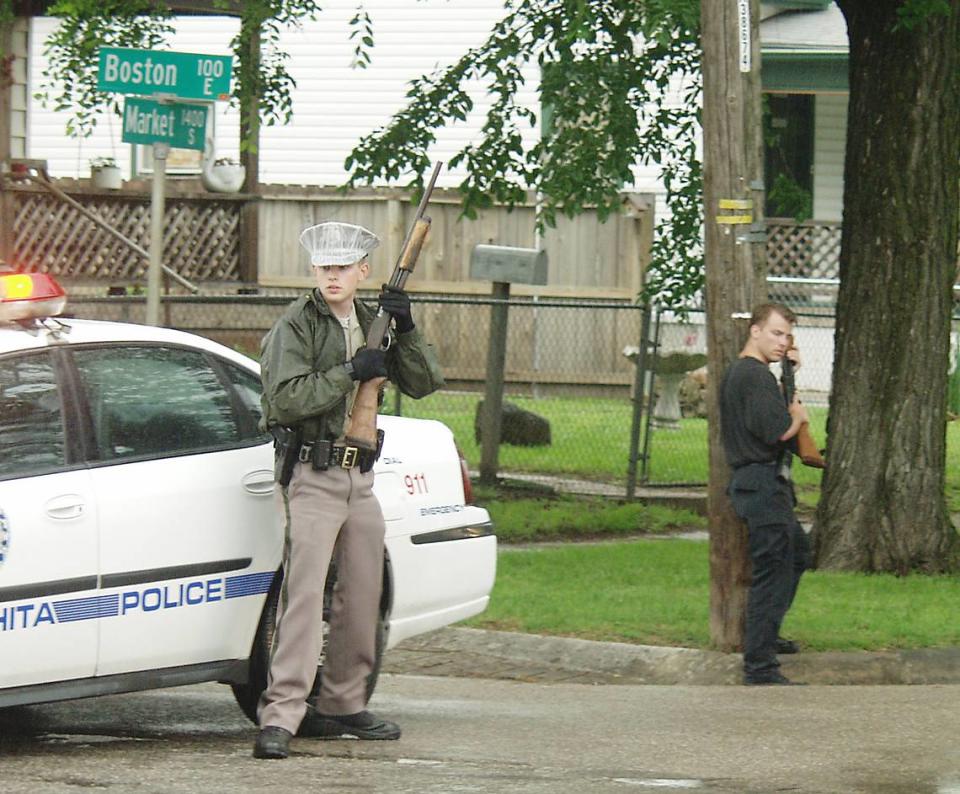‘Act of listening’: Retiring Wichita officer has spent years answering life-or-death calls
One evening early in Dan Oblinger’s career with the Wichita Police Department, he responded to a call he was unprepared for — a woman dangling over the guardrail on the top floor of the Bank of America parking garage downtown, intent on ending her life.
She felt alone, without hope.
He didn’t know what to do. He tried to tell her how she should feel and what she should do.
That didn’t help.
“That lasted probably 15 minutes, which doesn’t sound like a long time … but in that situation it feels like a lifetime,” the 42-year-old said, reflecting back on a career that was greatly influenced by the events of that night.
“Then I shut up and started listening to her. She had some stuff to say so once I stopped trying to convince her — and I couldn’t say anything, because I didn’t know what to say — she actually started talking. Then I figured out you just have to ask some questions.”
She started to warm up to him, feeling like she wasn’t all alone.
“This young, stupid cop, at least he’s listening to me,” he said. “I got one guy. I got an audience of one. And what I’ve found is that for most people, that’s enough. It certainly was for her that night.”
That night changed the course of his life and career. Oblinger now knew his calling. He began studying negotiating and dealing with people in a mental-health crisis.
Oblinger retired in February after nearly 22 years with the department, much of it in crisis negotiation and combating human trafficking.
That career — which has included implementing training for crisis negotiation and mental-health related calls that touches every officer in Kansas’ largest police department — almost didn’t happen.
Oblinger had planned to be a priest in the Catholic Diocese of Wichita. But a quarter of the way through seminary, he felt pulled in a different direction. He left, got a criminal justice degree from Wichita State University and joined the police department.
“It’s all about feeling called,” he said. “I felt called to go to seminary and then after discernment, after all the studying realized, I wasn’t supposed to continue in the seminary. Just listening to the Holy Spirit.”
It was that night in the Bank of America parking garage — about two years into his career — that made him realize his calling.
His faith came into play throughout his career, including in 2014 when he talked a woman out of jumping off the bridge at I-135 and Kellogg, then took her to pray at her child’s grave before taking her to the hospital.
Capt. Christian Cory said Oblinger is a “practitioner of listening.”
“The guy can relate to anybody,” said Cory, who worked alongside Oblinger as a crisis negotiator for a decade. “There’s instances where these people were ready to pull the trigger or jump off the building and Dan’s been able to talk to them and intercede and listen to them.
“Now he has a legacy that’s going to continue to last and there is a lot of great young and old negotiators that can say, ‘Hey, I was trained by Dan, I worked with Dan and now I’m continuing this process of crisis negotiation and deescalation with the Wichita Police Department,”’ Cory said.
Oblinger, a 1999 Mulvane High School graduate, said he’s proud of the small part he played in the police department, but every call is a team effort.
When the woman was looking to jump from the Bank of America parking garage, other officers helped with family who arrived and rerouting traffic.
When he responded to the woman in a similar situation on I-135 and Kellogg, a SWAT officer was by his side to protect him.
When he successfully talked a man into uncuffing his roommate, dropping the gun and coming outside, other officers were there helping to relay details.
And when he did undercover stings for human trafficking, he had a partner.
Human trafficking
In one instance, Oblinger and his partner, Travis Easter, now a captain, gathered enough evidence that police simultaneously raided 10 massage parlors, a house, an apartment and another business.
It was 2010.
Oblinger and Easter were following up on community tips as officers of the recently resurrected vice detective unit aimed at disrupting the burgeoning sex trafficking industry.
Capt. Randy Landen, now retired, gave them radios and cars and said ‘go figure things out, what needs to be done,”’ Oblinger recalled, adding Landen told them they would have to build their case from scratch.
Three people were indicted and sentenced in those cases. Oblinger and Easter also worked stings on businesses that led to prosecutions.
Oblinger testified at cases of human traffickers both as a detective and later as a sergeant over detectives working those cases.
Human trafficking, he said, includes children, massage parlor workers and prostitutes people see on the streets. The internet has made it more prevalent than ever, he said, both in Wichita and cities around the country.
“People are being recruited and enticed into human trafficking so they can be worked into the commercial sex industry,” he said.
Oblinger helped get three women out of the industry while working as the lead detective — he oversaw more successful cases working as a sergeant over the unit for the last 10 years he was with the department.
“That was some of the most rewarding work I did for the police department, right alongside the hostage negotiator stuff,” he said. “Because that’s long-term stuff. They get their life back.”
In one of those cases, a woman was being made to work as a prostitute by a violent man; another case involved an older woman who went from a sex worker to facilitating other sex workers before she had enough.
“If you have enough interactions with them over time, they begin to believe you when you say, ‘You can get out if you want and I can help you,’” Oblinger said. “They rarely believe you the first time you say that. But for one lady it was the second time and for (the older woman) it was like the 10th time.”
He added: “This work is gentle persistence: Leave them better than you found them every time. Be different and have a clear contrast between you and their trafficker. Where what we do is based on consent, what they do is based on power and control.”
Oblinger said they also raided night clubs and did different stings, including on Broadway. He also helped get a city ordinance passed that allows officials to better regulate massage parlors.
“We’ve gotten people into recovery, we’ve taken off traffickers,” he said. “We’ve arrested a ton of buyers. It’s important work and it continues after I leave.”
Training officers
Oblinger helped write the curriculum to teach crisis negotiation and mental health training for cadets in the police academy. He also helped teach those courses to cadets and longer versions to officers who wanted to get certified in those areas.
Those trainings equip every existing officer, many former and many more to come to better respond on calls. The Wichita Police Department is the largest in the state with over 600 officers.
Oblinger and John Ryan, now a sergeant, in partnership with different organizations around the county, brought the mental health training to the police department in the late 2000s.
The training, called Crisis Intervention Team, started in Memphis after a young Black man was killed there by police in 1987. The man, who had a knife, had a history of mental illness and cutting himself.
The training has been proven to increase officer awareness of mental health, lower incidents with use of force, injuries and arrests by helping the officers steer the person to community resources, according to the Center for Police Research and Policy University of Cincinnati.
Ryan, a 30-year veteran of the department, said the training saves lives. As sirens went off in the background while he worked a night in March, he said the training is more important than ever with drugs being more potent and cheaper than ever.
About 500 officers in the county have taken the week-long class, Ryan said, adding that officers always gave the course great reviews.
“They are kind of a tough audience on ya. Dan was always well spoken of by the officers in training. If they don’t … think it’s relevant … they come right out in telling you,” Ryan said. “Dan is a great teacher. I helped out with scenarios, role playing and all that, but Dan’s strength is talking to people and teaching and really getting people interested in something.”
Oblinger and Cory also helped train crisis negotiators and grew the team from four when they started to around 14 today. The team now includes a psychologist that helps diagnose what barricaded people might be suffering from.
“It’s one of the best negotiator teams in the country,” Oblinger said.
Oblinger also trained others to teach a crisis negotiation course.
The passion to learn more about crisis negotiation started with that call on the Bank of America parking garage early in his career.
“It was an intense situation to do by yourself as an officer with very little training and realizing that I had so much to learn. I felt totally inadequate,” he said. “She didn’t jump, she chose to live … That was a great feeling. That led me to start studying negotiations and mental health and de-escalation and the act of listening.”
Crisis negotiation
Oblinger took the woman to the hospital and stayed with her until she got the help she needed. They talked about life. She mentioned she wanted to write a book.
“In a town of almost half a million people, there’s people who feel all alone,” he said. And probably everyone in town feels that from time to time. And how strange is that, right?”
She died several years later of a drug overdose, Oblinger said.
About 10 years after the parking garage call, Oblinger responded to a similar call about a woman on the I-135 bridge over Kellogg.
He had been a crisis negotiator for a few years at that point.
She was on the phone and straddling the guardrail when he arrived. The woman, whose child had died, had called family to tell them she was going to end her life.
Police rerouted traffic on I-135 and Kellogg as Oblinger talked to her for an hour.
“It’s like the lowest level of ask for another human being is ‘Hey, I will listen to you,”’ he said.
She wondered if ending her life would bring her closer to her child. Oblinger had gained her trust and offered up a suggestion: She could be with her child and he would take her there and pray alongside her.
She came off the guardrail. They went to the grave and prayed. Oblinger told her to take all the time she needed. Then, he took her to the hospital.
Oblinger got an email from her more than a year later, thanking him for what he did that day.
“I know she got to a better place,” he said.
Oblinger responded to hundreds of calls as a crisis negotiator. Calls, which have been increasing over the years, come on nights, weekends and holidays, he said.
“You have to have true passion to sustain that,” Oblinger said, adding he stayed in it longer than most people do.
In retirement, he will have more time to spend with his family — his wife and six children. He plans to continue his business consulting with construction and engineering companies in listening and negotiating. The same principles apply in both police situations and business, he said, including managing emotions and working collaboratively.
‘You don’t get to choose how it ends’
During his police career, Oblinger also oversaw calls where intervention didn’t succeed.
“Some people are just committed and they get to choose,” he said. “Fundamentally what makes crisis negotiation work hard is you don’t get to choose how it ends. Just the nature of it, somebody else is choosing how it ends. That’s why your role is to listen, build a relationship, persuade.”
“Everybody is on a sliding scale of cooperation in that process. Some people have a story to tell. Once they realize you are a genuine listener, things go pretty smoothly. Some people don’t trust the police, they have ulterior motives, they’re up to stuff, they’re trying to prevent you from finding it out and they know they have to talk to you to keep SWAT at bay, but they’re engaged in complex deception.”
Crisis negotiators get thrown into the middle of a story and quickly try to gather details and get the person on the phone, which takes their focus off of any hostages. Any call they go to is a bad situation, but some are worse than others.
One of the worst scenarios Oblinger responded to was a man holding his roommate hostage at gunpoint. The man had handcuffed the roommate to a banister after thinking the roommate stole his methamphetamine.
He had fired a round before officers arrived at the home in 2015 near Harry and Oliver.
The man had a history of mental health problems, had shot at someone the night before and had been in a chase with police days before. The veteran didn’t have any respect for laws, Oblinger said.
“This one was all bad,” he said. “Your heart sinks as a negotiator when you find out it is that. It’s super complex.”
After hours on the phone, including a three-way call with the 24-year-old suspect and 19-year-old hostage, Oblinger talked the man into freeing his roommate. But then the man barricaded himself inside after seeing SWAT.
He tried to convince Oblinger that the police needed to leave, that they were violating his rights.
Oblinger said, in this unique incident, the man wanted to know the exact charges he would be arrested on so Oblinger verified with his boss what those would be. The man agreed to put down the gun and surrender an hour after freeing his roommate.
“It’s not all just holding hands and like you’re amazing to people,” Oblinger said. “A lot of it is reality checks and setting expectations that are reasonable for people. In the beginning, it’s listening … but once they know you are serious and they know that you are treating them like a human being and being fair with them, you tell them the truth. Otherwise, you’ll be there forever. People loved to be listened to.”





